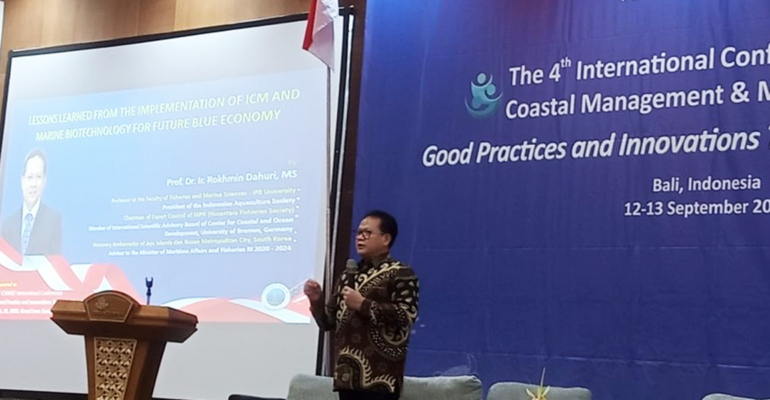PKSPL IPB University and PEMSEA: 40 Years of Integrated Coastal Management and its Role in the Future Blue Economy

The Centre for Coastal and Marine Resources Studies (PKSPL) IPB University together with Partnerships in Environmental Management for the Seas of East Asia (PEMSEA) organised the Plenary Session of the International Conference on Integrated Coastal Management and Marine Biotechnology (4th ICMMBT). In this activity, the role of integrated coastal management (ICM) for the future blue economy was revealed.
“Integrated coastal management (ICM) has entered its 40th year since the concept was first formulated in 1965. ICM will continue to evolve and prepare to enter a new phase, namely realising a sustainable blue economy,” said Aimee T Gonzales, Director of PEMSEA or the Partnership for Environmental Management in East Asia based in Manila, Philippines at the 4th ICMMBT event at the Grand Inna Kuta Hotel, Bali some time ago.
He explained that the ICM approach is a system of governance and management that regulates human behaviour to maintain the integrity of land and ocean ecosystem functions in a sustainable manner. ICM works on several levels and objects, namely the establishment of political legitimacy, knowledge building and technical investment, fulfilment of universal norms in coastal management, governance accountability, and encouraging collaboration/partnership.
“From all of them, there are three keys to the success of ICM, namely coordination, integration and adaptation,” concluded Aimee.
Prof Rokhmin Dahuri, Main Advisor of PKSPL IPB University emphasised that blue economy is a new chapter to achieve human welfare. According to him, ICM is very relevant to realising that, because this concept wants to ensure that the utilisation of coastal resources bases its considerations on scientific arguments and sustainability, not growth mania.
“Indonesia is the largest archipelago in the world with abundant potential. The potential of the marine sector is estimated to reach US$ 1.4 trillion per year or 1.2 times greater than Indonesia’s national gross domestic product (GDP) in 2022 and has the opportunity to provide jobs for 45 million people,” Prof Rokhmin said.
But in fact, he continued, the contribution of the marine sector is no more than 15 per cent. This percentage is far less than countries with smaller sea potential but the contribution reaches more than 30 per cent.
“There are four root causes that are currently causing negative phenomena in coastal Indonesia. They are high population, consumptive and destructive human behaviour, the double-edged sword of technology and the lack/absence of specific policies/regulations governing the governance of a coastal area,” concluded Prof Rokhmin Dahuri.
The above challenges were reaffirmed by Aimee Gonzales who stated that the blue economy is directed to be an alternative approach to answer several problems. For example, responding to threats that are just business as usual; unhealthy seas that erode economic potential, food supply, food security and community resilience; and overcoming conflictual relationships between marine resource protection and economic growth.
“The blue economy provides a huge space for innovation, clean technologies and market opportunities. For this reason, ICM can take a role to encourage the emergence of a framework for the management and governance of coastal and marine resources towards the achievements of the blue economy,” he said. (yop/Rz) (IAAS/RUM)



